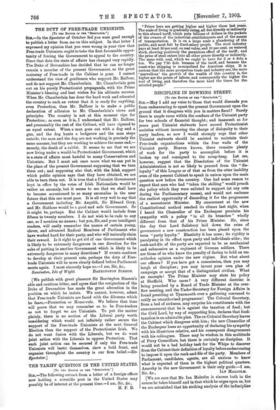THE DUTY OF FREE-TRADE UNIONISTS.
[To ma EDITOR OF TEE "SPECTATOR"]
SIR,—In the Spectator of October 3rd you were good enough to publish a letter from me on this subject. In that letter I expressed my opinion that you were wrong in your view that Free-trade Unionists ought to take the first favourable oppor- tunity of forcing the Government to appeal to the country. Since that date the state of affairs has changed very rapidly. The Duke of Devonshire has decided that be can no longer remain a member of the present Government, so the great mainstay of Free-trade in the Cabinet is gone. I cannot understand the view of gentlemen who support Mr. Balfour, and do not support Mr. Chamberlain. Mr. Chamberlain goes out on his purely Protectionist propaganda, with the Prime Minister's blessing and best wishes for his ultimate success. When Mr. Chamberlain has done the bard work and educated the country to such an extent that it is ready for anything, even Protection, then Mr. Balfour is to make a public declaration of adhesion to Mr. Chamberlain's views and principles. The country is not at this moment ripe for Protection ; as soon as it is, I understand that Mr. Balfour, and presumably the rest of the Cabinet, will have ripened to an equal extent. When a man goes out with a dog and a gun, and the dog hunts a hedgerow and the man stops outside, the man and the dog are not working in precisely the same manner, but they are working to achieve the same end,— namely, the death of a rabbit. It seems to me that we are now living under a would-be Protectionist Government, which is a state of affairs most hateful to many Conservatives and Unionists. But I must ask once more what we can put in the place of the present Government supposing that we turn them out ; and supposing also that, with the Irish support which public opinion says that they have obtained, we are able to turn them out. It is true that a Unionist Government kept in office by the votes of Irish Nationalists would be rather an anomaly, but it seems to me that we shall have to become accustomed to so many anomalies in the near future that this one must pass. It is all very well to say that a Government including Mr. Asquith, Sir Edward Grey, and Mr. Haldane would be a good and safe Government. So it might be, perhaps. But the Cabinet would include from fifteen to twenty members. I do not wish to be rude to any one, so I mention no names; but you, Sir, and your intelligent readers, will easily remember the names of certain young, clever, and advanced Radical Members of Parliament who have worked hard for their party, and who will naturally claim their reward. Is it right to get rid of one Government which is likely to be extremely dangerous in one direction for the sake of putting in another Government which is likely to be extremely dangerous in many directions ? If events continue to develop at their present rate, perhaps the duty of Free- trade Unionists will be more clearly defined before Parliament meets again. I most sincerely hope so.—I am, Sir, &c., [We publish with great pleasure Sir Barrington Simeon's able and cautious letter, and agree that the resignation of the Duke of Devonshire has made the great alteration in the position on which he insists. We cannot, however, admit that Free-trade Unionists are faced with the dilemma which he fears,—Protection or Home-rule. We believe that time will prove that we may remember so to be Free-traders as not to forget we are Unionists. To put the matter plainly, there is no section of the Liberal party worth considering which would not infinitely rather secure the support of the Free-trade Unionists at the next General Election than the support of the Protectionist Irish. We do not want fusion with the Liberals, but we do want joint action with the Liberals to oppose Protection. That such joint action can be secured if only the Free-trade Unionists will bestir themselves, show a bold front, and organise throughOut the country is our firm belief.—En. Spectator.]






























































 Previous page
Previous page